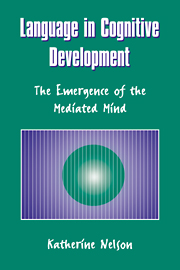
-
Select format
-
- Publisher:
- Cambridge University Press
- Publication date:
- 05 June 2012
- 13 June 1996
- ISBN:
- 9781139174619
- 9780521551236
- 9780521629874
- Dimensions:
- (228 x 152 mm)
- Weight & Pages:
- 0.72kg, 450 Pages
- Dimensions:
- (228 x 152 mm)
- Weight & Pages:
- 0.6kg, 452 Pages
- Subjects:
- Developmental Psychology, Psychology, Cognition
You may already have access via personal or institutional login- Subjects:
- Developmental Psychology, Psychology, Cognition
Book description
Contemporary study of language and cognition in infancy and early childhood has received considerable, well deserved attention. However, little effort has been directed to the means by which language becomes a cognitive and communicative tool, as well as what the full implications of this development may be. This book highlights a transition from the study of language and cognition to that of language in cognition. It presents an integrative theory of cognitive development, emphasizing the important role that language plays in taking the two to five year old child to new levels of cognitive operations in memory, forming concepts, categories, processing narratives, and understanding other people's intentions. Biological evolution is considered the source of both language and culture but it is argued that qualitatively different modes of thinking and knowing emerge therefrom.
Reviews
"What Nelson has done, though, in a readable, accessible, but very thorough way, is put children's communicative development into relation with their prior understanding and memory for events and with their later emerging capacity to produce autonomous discourse and to enter into the worlds of knowledge that it makes possible...This book by Nelson brings together the fields of linguistic and cognitive development by describing how acquiring language makes possible massive changes in the scope of cognition." Catherine Snow, Science
"Language is the channel through which culture is recreated for every generation, through which knowledge is transmitted, and through which the autobiographical self is established....This book by Nelson brings together the fields of linguistic and cognitive development by describing how acquiring language makes possible massive changes in the scope of cognition." Catherine Snow, Science
"Language is the channel through which culture is recreated for every generation, through which knowledge is transmitted, and through which the autobiographical self is established....This book by Nelson brings together the fields of linguistic and cognitive development by describing how acquiring language makes possible massive changes in the scope of cognition." Catherine Snow, Sicence
"Nelson's ambitious, timely, and far reaching theory should stimulate readers to rethink how cognitive development takes place." James N. Forbes, Child Development Abstracts and Bibliography
"...a truly significant contribution to the study of cognitive development." Michael Tomasello, Contemporary Psychology
"The book deserves the serious attention of all scientists who wish to understand how human beings proceed ontogenetically from the individually based cognition characteristic of primates in general to the kinds of collective cognition, embodied in language and other cultural artifacts, that characterize mature Homo sapiens" Michael Tomasello, Contemporary Psychology
"For linguists, the main value of the book lies perhaps not in the originality of its view on language acquisition as a process of collaborative construction of culture-specific concepts and categories through which the child becomes a member of a culture and a social group, but more in the convincing way this view is substantiated with a wealth of interesting data which no one interested in language acquisition can afford to ignore." Language
"In sum, this important and thought-provoking book sets an ambitious agenda and progresses a long way toward achieving it." Maureen A. Callanan, Human Development
Contents
Metrics
Altmetric attention score
Full text views
Full text views help Loading metrics...
Loading metrics...
* Views captured on Cambridge Core between #date#. This data will be updated every 24 hours.
Usage data cannot currently be displayed.
Accessibility standard: Unknown
Why this information is here
This section outlines the accessibility features of this content - including support for screen readers, full keyboard navigation and high-contrast display options. This may not be relevant for you.
Accessibility Information
Accessibility compliance for the PDF of this book is currently unknown and may be updated in the future.


